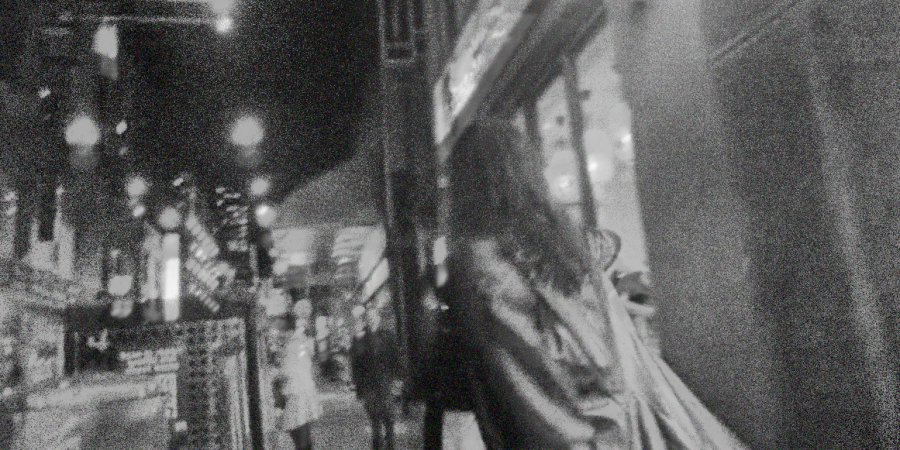A document of the last moments of a community garden, destroyed while beetroots are still blooming (‘The Gardens’); a testament to the plight of seafarers who, victim to beyond-Kafkaesque stories of capitalist exploitation and neglect, find themselves adrift in dismaying conditions (‘Above Water’); an electric music video with the canted, fish-eyed coolness of Wong Kar-Wai’s Fallen Angels (for the song ‘Sofj,’ by the mysterious Melbourne outfit Dregs). These are just three highlights from a program of shorts, Dogmilk: Collection, screening this Sunday the 16th of June as part of this year’s St Kilda Film Festival.
Created and curated by Dogmilk Films, a Melbourne-based, internationally-reaching filmmaking collective who’ve recently brought cinema to the dancefloor with a series of projections at Miscellania, the program is eagerly diverse, with each short feeling like a surprise. There are works of fiction and nonfiction, complete and incomplete films (an in-progress fragment from ‘Aluk,’ directed by Chris Cochrane-Friedrich, in which a boy in Indonesia’s ricefields is taught by his grandfather, a Toraja elder, to fish, is another beautiful entry). Apart from a taste for lush tones and rich grain, what happens to stream through the program is a sense of patience—for duration, meditation, and experimentation—which is nevertheless brought to bear on subjects of great urgency.
* * * *
‘The Gardens’ (2022)

‘The Gardens’ is an observational short filmed and edited by Paddy Hay and Giles Fielke, which documents the final days of the Collingwood Community Garden allotments before they were razed by the Collingwood Children’s Farm’s management in 2022 for the sake of under-consulted redevelopment. Captured on expired super 16mm stock, the film’s resulting grain has the timbre of sand or soil, and conjures lines like scraggly worms, as the filmmakers shoot the bulging garden beds, welcome signs, and overgrown outskirts of this patch of lovingly cultivated ‘crown land.’ These images appear as still lives, edited together like a relaxed heartbeat, poignantly evoking both the calmness of the space and the helplessness of its fate.
The gardens can’t be so easily confined to memory, however. Cast over the footage are the voices of some of their tenders: “I’m going to take my chillies,” insists one gardener calmly. “When they are blind from something in their vision that stops them from seeing the beauty in this place for everyone… I don’t know what to say,” reflects another. There are also the insistent calls of the farm’s birds, seemingly mixed to a near-supernatural loudness, as if they’ve evolved to reach over the rattle of machinery. With the film grain’s weatherworn quality imbuing us with an ache of familiarity throughout, ‘The Gardens’ subtly bears witness to the preciousness (and precarity) of public space, and to the grief wrought by its loss.
* * * *
‘Above Water’ (2022)

Near the end of ‘Above Water,’ Chirag Bakri of the International Seafarers Welfare and Assistance Network says of its subjects: “They are the invisible workforce. People don’t realise that there are humans on board.” Stuck at the bottom of a supply chain hierarchy including investors, corporations, and private employers—and beyond the boundaries of national law—seafarers are liable to be left marooned in foreign waters. Without ample resources (let alone connection to family, or the knowledge of when they will see them again), these seafarers are forced to remain onboard to lay claim to their wages.
Walton’s film works against and through a slew of challenges: how can these experiences of neglected seafarers, isolated across the earth, be portrayed with a degree of clarity and coherence capable of penetrating the cruelty of their situation, which itself depends on a sense of invisibility? Combined with the voiceovers of actual seafarers, an innovative approach to animation is part of her answer. Their faces and backgrounds rendered by rotoscope processing, the interviewees speak directly to camera as moving shadows—a method which preserves their anonymity, yet emphasises their movements, as they gesture in desperation. ‘Above Water’ is a closely-researched, expository film about how easily ‘offshore’ injustices are obscured, but it also troubles the journalistic urge to simply ‘reveal’ static images of exploitation and suffering.
Ships’ interiors, meanwhile, are visualised with 3D-animated sequences. In a segment about a boat stranded amid COVID-era importation sanctions, an animated overhead shot tracks over the vessel’s inner walls, recording figures splayed sleepless in dilapidated cabins, while a voiceover explains how the crew had passed the time in this “sea prison” (drawing, visiting one another’s rooms to talk). Animation is not just a way around a lack of access; it reconstructs space as it is felt, as a site of both extreme despair and solidarity.
* * * *
‘Dregs – Sofj’ (2023)
Lone motorcyclists passing through arches on twilit highways; a ring of suave, poker-faced players around a smoky card table; a woman in leather dancing through neon alleys; sunglasses in the dark; a slow-motion chase abstracted into beams of light. A story of a slick assassin traipsing Melbourne’s underground and feasting in Chinatown told in mesmerising figments, the music video for ‘Sofj,’ directed and produced by Chris Cochrane-Friedrich and Lola Hewison with cinematography by Lawrence McCrabb, is a feat of unbridled atmosphere—one well worth watching on a cinema screen.
Dogmilk: Collection is screening on Sunday the 16th of June as part of the St Kilda Film Festival. The screening will feature a Q&A with the filmmakers.
Full program:
‘Above Water’ by Alex Walton
‘Speed and Movement’ by John Hewison
‘Dregs – Sofj’ by Lola Hewison & Chris Cochrane-Friedrich
‘The Gardens’ by Paddy Hay & Giles Fielke
‘Aluk (a work in progress)’ by Chris Cochrane-Friedrich
‘All We Have Is Time’ by Fraser Pemberton
‘Fugue’ by Sofie McClure
**********
Indigo Bailey is a Tasmanian writer and editor living in Naarm/Melbourne. In 2023, she received the Island Nonfiction Prize for an essay about rain sound. She has written for Island Magazine, The Guardian, Voiceworks, and Kill Your Darlings, among other publications.


